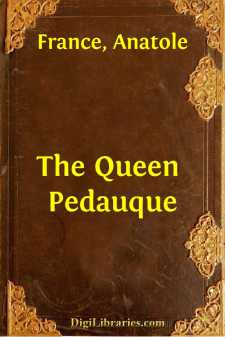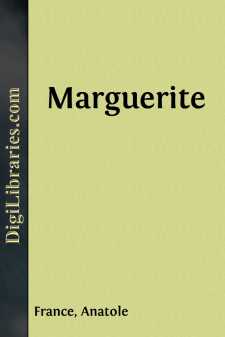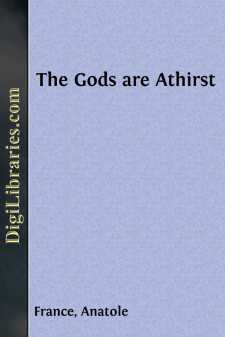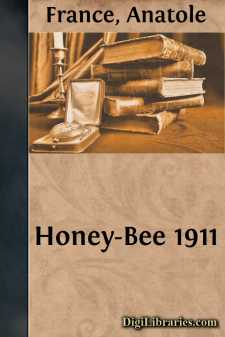Categories
- Antiques & Collectibles 13
- Architecture 36
- Art 48
- Bibles 22
- Biography & Autobiography 813
- Body, Mind & Spirit 142
- Business & Economics 28
- Children's Books 17
- Children's Fiction 14
- Computers 4
- Cooking 94
- Crafts & Hobbies 4
- Drama 346
- Education 46
- Family & Relationships 57
- Fiction 11829
- Games 19
- Gardening 17
- Health & Fitness 34
- History 1377
- House & Home 1
- Humor 147
- Juvenile Fiction 1873
- Juvenile Nonfiction 202
- Language Arts & Disciplines 88
- Law 16
- Literary Collections 686
- Literary Criticism 179
- Mathematics 13
- Medical 41
- Music 40
- Nature 179
- Non-Classifiable 1768
- Performing Arts 7
- Periodicals 1453
- Philosophy 64
- Photography 2
- Poetry 896
- Political Science 203
- Psychology 42
- Reference 154
- Religion 513
- Science 126
- Self-Help 84
- Social Science 81
- Sports & Recreation 34
- Study Aids 3
- Technology & Engineering 59
- Transportation 23
- Travel 463
- True Crime 29
The Queen Pedauque
by: Anatole France
Description:
Excerpt
What one first notes about The Queen Pedauque is the fact that in this ironic and subtle book is presented a story which, curiously enough, is remarkable for its entire innocence of subtlety and irony. Abridge the "plot" into a synopsis, and you will find your digest to be what is manifestly the outline of a straightforward, plumed romance by the elder Dumas.
Indeed, Dumas would have handled the "strange surprising adventures" of Jacques Tournebroche to a nicety, if only Dumas had ever thought to have his collaborators write this brisk tale, wherein d'Astarac and Tournebroche and Mosaide display, even now, a noticeable something in common with the Balsamo and Gilbert and Althotas of the Memoires d'un Medecin. One foresees, to be sure, that, with the twin-girthed Creole for guide, M. Jerome Coignard would have waddled into immortality not quite as we know him, but with somewhat more of a fraternal resemblance to the Dom Gorenflot of La Dame de Monsoreau; and that the blood of the abbe's death-wound could never have bedewed the book's final pages, in the teeth of Dumas' economic unwillingness ever to despatch any character who was "good for" a sequel.
And one thinks rather kindlily of The Queen Pedauque as Dumas would have equipped it… Yes, in reading here, it is the most facile and least avoidable of mental exercises to prefigure how excellently Dumas would have contrived this book,—somewhat as in the reading of Mr. Joseph Conrad's novels a many of us are haunted by the sense that the Conrad "story" is, in its essential beams and stanchions, the sort of thing which W. Clark Russell used to put together, in a rather different way, for our illicit perusal. Whereby I only mean that such seafaring was illicit in those aureate days when, Cleveland being consul for the second time, your geography figured as the screen of fictive reading-matter during school-hours.
One need not say that there is no question, in either case, of "imitation," far less of "plagiarism"; nor need one, surely, point out the impossibility of anybody's ever mistaking the present book for a novel by Alexandre Dumas. Ere Homer's eyesight began not to be what it had been, the fact was noted by the observant Chian, that very few sane architects commence an edifice by planting and rearing the oaks which are to compose its beams and stanchions. You take over all such supplies ready hewn, and choose by preference time- seasoned timber. Since Homer's prime a host of other great creative writers have recognised this axiom when they too began to build: and "originality" has by ordinary been, like chess and democracy, a Mecca for little minds.
Besides, there is the vast difference that M. Anatole France has introduced into the Dumas theatre some preeminently un-Dumas-like stage-business: the characters, between assignations and combats, toy amorously with ideas. That is the difference which at a stroke dissevers them from any helter-skelter character in Dumas as utterly as from any of our clearest thinkers in office.
It is this toying, this series of mental amourettes, which incommunicably "makes the difference" in almost all the volumes of M. France familiar to me, but our affair is with this one story. Now in this vivid book we have our fill of color and animation and gallant strangenesses, and a stir of characters who impress us as living with a poignancy unmastered as yet by anybody's associates in flesh and blood....












